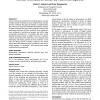Free Online Productivity Tools
i2Speak
i2Symbol
i2OCR
iTex2Img
iWeb2Print
iWeb2Shot
i2Type
iPdf2Split
iPdf2Merge
i2Bopomofo
i2Arabic
i2Style
i2Image
i2PDF
iLatex2Rtf
Sci2ools
CHI
2010
ACM
2010
ACM
Multitasking and monotasking: the effects of mental workload on deferred task interruptions
Recent research has found that forced interruptions at points of higher mental workload are more disruptive than at points of lower workload. This paper investigates a complementary idea: when users experience deferrable interruptions at points of higher workload, they may tend to defer processing of the interruption until times of lower workload. In an experiment, users performed a mail-browser primary task while being occasionally interrupted by a secondary chat task, evenly distributed between points of higher and lower workload. Analysis showed that 94% of the time, users switched to the interrupting task during periods of lower workload, versus only 6% during periods of higher workload. The results suggest that when interruptions can be deferred, users have a strong tendency to “monotask” until primary-task mental workload has been minimized. Author Keywords Multitasking, interruption, attention, problem state, chat, instant messaging. ACM Classification Keywords
CHI 2010 | Human Computer Interaction | Lower Workload | Mental Workload | Primary-task Mental Workload |
| Added | 17 May 2010 |
| Updated | 17 May 2010 |
| Type | Conference |
| Year | 2010 |
| Where | CHI |
| Authors | Dario D. Salvucci, Peter Bogunovich |
Comments (0)

